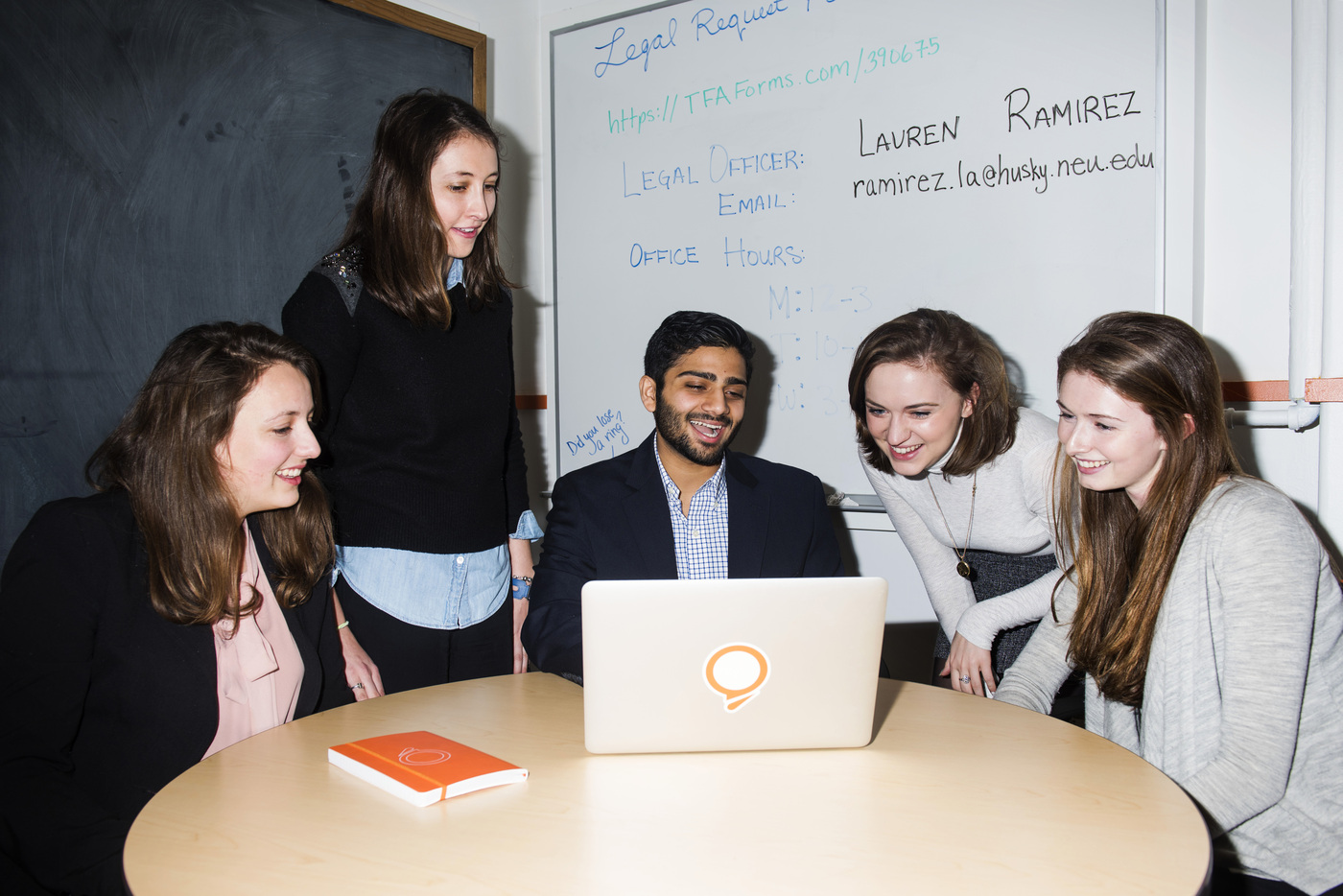IDEA CEO reflects on lessons learned, entrepreneurship opportunities on campus

When it comes to Northeastern’s entrepreneurship ecosystem, Neel Desai has seen it all. As the Altschuler-Meyer CEO of IDEA, the university’s student-run venture accelerator, he works closely with students, faculty, staff, and alumni to help ventures reach their potential.
IDEA, which currently counsels more than 200 active ventures, has worked with 850 concepts, launched 45 startups, and helped ventures raise $68 million in external funding since its inception in 2009. IDEA is also part of Mosaic, an alliance of student-led organizations that supports venture incubation on campus. Through Mosaic, Desai builds strong relationships with other entrepreneurship leaders across campus and explores how IDEA can collaborate with these groups to meet the needs of Northeastern ventures and expand IDEA’s impact on campus.
We asked Desai, SSH’17—a senior economics major—to discuss his experience as CEO, what he’s learned about entrepreneurship and management, and what he’d identify as the common characteristics that successful entrepreneurs often share.
You were named CEO this past summer. How did you initially get involved with IDEA?
Before I became CEO, I got involved with IDEA as a coach. Coaches work one-on-one with ventures and build relationships with entrepreneurs. I was interested in working directly with ventures, helping them think through their business models and how they were going to execute on various milestones. I got familiar with the team and coaches and was pleasantly surprised by how big an operation IDEA is. Being in the trenches as a coach was eye opening in terms of realizing the impact IDEA can have on early-stage founders.
Later, I started helping out on the operations side of IDEA. When the opportunity to become CEO arose, it was so unique a position that I was eager to learn more. Being able to work with entrepreneurs, a management team of highly motivated students, and coaches was an opportunity I couldn’t pass up.
I’m also the first CEO from outside the D’Amore-McKim School of Business. Northeastern has embraced an interdisciplinary approach to entrepreneurship, and I’ve brought on a more diverse team of students across the various colleges.
How did your interest in entrepreneurship begin?
In high school I started my own nonprofit origination called Technology for Tomorrow that connects high schools with senior homes and provides technology literacy classes. We work closely with the U.S. State Department and the AARP. It’s grown significantly since then, and now I sit on the advisory board. That was my first step into entrepreneurship, and seeing the impact I can have on my team and the people I’m working with was motivating.
After coming to Northeastern, I got involved in social entrepreneurship. I participated in a Dialogue of Civilizations program in South Africa the summer after freshman year, where I conducted field research, consulted with various organizations, and worked with entrepreneurs in poor villages. Last summer, I was a TA on a Dialogue program in India, an experience that combined my interests in business and creating social impact. For me, social entrepreneurship was the outlet through which I could use my formal training in business for social good. I wanted to bring that experience and passion to IDEA.
Over the past several years, there’s been an explosion of entrepreneurship on campus. What’s your impression of the opportunities available to students who want to get involved in entrepreneurship?
Students can start their own ventures and get resources to successfully grow those ventures. Or, they can double down on their own domains of expertise and build out those skill sets. If you are an engineer, you can become a better engineer within this network. People are getting value on both sides. It’s not just the ventures that benefit; students working in Mosaic organizations such as Scout and Generate are providing services to those ventures, building out their portfolios, landing new co-ops as a result of having this experience.
There’s a notion at other schools that students have to drop out of school to launch their ventures. It’s the exact opposite at Northeastern, because the university provides so many resources for entrepreneurship.

Neel Desai meets with members of the IDEA leadership team earlier this semester. Photo by Adam Glanzman/Northeastern University
What have you gained or learned most from your management role?
It’s been an incredibly challenging and meaningful experience thus far. I lead a team of 25 undergrads and 35 coaches, work closely with faculty and staff, and report to our board of advisors and donors. For me, it’s been a great learning experience working with so many stakeholders, and it’s been a crash course in management, leadership, and finding out what drives people to get involved. That’s been a very meaningful experience for me, seeing students become better leaders and helping these ventures out.
From being involved with IDEA, one thing I’ve learned is just how difficult starting a successful business can be. Entrepreneurship is glamorized, but seeing how difficult it is to successfully—that’s the key word—start a venture and have a sustaining impact has been eye-opening. A majority of startups fail. That’s the name of the game. But that experience is still valuable for students. For a majority of our ventures, this is not their first concept.
The most important thing I’ve learned is that at the core of any business is the problem the entrepreneurs are trying to solve. I’d urge anyone who is starting a business to have a burning desire, something that prevents you from sleeping when you run into a problem you can’t solve. It’s also critical to validate your concept. The majority of ventures and entrepreneurs are tied emotionally to their ideas. The first step in our process is to validate their products or services. It’s important to get feedback at the start and throughout launching a business.
From your experience working with ventures through IDEA, are there common characteristics that successful entrepreneurs often share?
I’d say a relentless work ethic; being a good listener, particularly to feedback; and problem solving. There will be new and ambiguous situations no one has heard of before that entrepreneurs are often on the frontier of, and that’s why it’s hard—because it hasn’t been done before. I’d also say successful entrepreneurs embrace the process. This includes reflecting on the experience, thinking critically about what you’re trying to achieve, and getting back up when you fail. The last thing that comes to mind is focusing on the impact. The most successful ventures keep the impact and the problem they’re solving at the core of what they do. The business is merely a means to an end, a way to scale that impact.
As CEO, you’ve not only built your own management teams but you’ve worked with dozens of ventures that have their own management teams. What have you learned about team building throughout this experience?
Surround yourself with others who complement your weaknesses. Be very honest with yourself and your team about your own strengths and weaknesses. Bring in a diverse team of people with different backgrounds and people who have even more experience than you or domain experience that you don’t have. And lastly, the culture of the team is extremely important. This is tough to predict, but it starts at the top in making clear the culture in which everyone operates is open, honest, and collaborative. That needs to a conscious, deliberate decision. I’ve seen ventures break down. It doesn’t always work out. It’s important to make sure that early on, everyone is on the same page and understands what the goals are. The one thing you can’t compromise on is goals. When goals are different, that’s when problems often arise.
You graduate in May. Has your experience as CEO of IDEA shaped where you think you’d like your career to lead?
My experience leading the team at IDEA has validated my desire to solve problems and operate within an early stage venture. I am particularly interested in enterprise software and will be joining the team at Price Intelligently as a product manager after graduating. I know that I’d like to be in a fast paced, collaborative setting, working on high impact initiatives. Longer term, my vision is to leverage technology to help people in meaningful ways and be at the intersection of technology and social impact.





